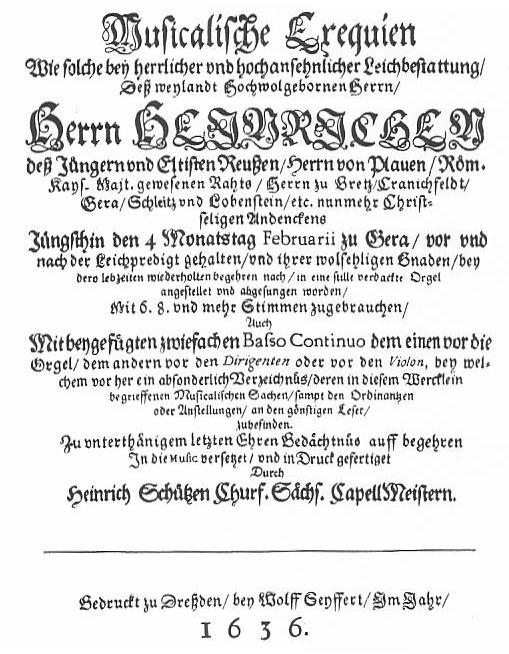What?
For the funeral of Count Heinrch Posthumous (yes, I'm not kidding) Reuss, Schütz composed a Lutheran type of funeral mass, the Musikalische Exequien, completely unique in form.
 |
| The Kreuzkirche in Dresden where Schütz worked. |
The first movement is the Lutheran "missa brevis," the Kyrie and Gloria for six voices and/or instruments - Schutz and other of the time believed in an early sort of Gebrauchsmusik in which they could customize it depending on the forces available. Only single parts of this score are extant, so there may have been any number of combinations in voicing or instruments. Here, biblical texts showing the Christian's beliefs concerning death and resurrection are accentuated with chorale verses in a straightforward cantionale-homophonic texture. As if to comfort the grieving listener, key concept in each verse are painted very obviously or repeated motivically. For example, the Romans 14:8 mini-aria preceding the Kyrie II describes "living" and "dying" in Christ with appropriately perky or languid tempi. "Our true life is in heaven," a duet sings, where the believer's likeness is transfigured unto Christ's, illustrated by a similar ornament transforming the word. "The souls of the righteous are in God's hand" by the full ensembles is surrounded by the sopranos echoing "But they are at peace" (Ecclesiastes 3:1-3), wrapping the hearts of the faithful in rest.
Secondly, Psalm 73:25-26, the sermon text, becomes a double-choir motet. The rich scoring does in no way obligate it to be overpowering, but instead it creates a quietly intense, prayerful tone. "Whom have I in heaven but You? And there is none upon earth that I desire besides You. My flesh and my heart fail; but God is the strength of my heart and my portion forever." Listen carefully. Is there a familiar chorale melody hidden in there? Hint: it seems to be a common occurrence. At the end, "my comfort" and "my part" scattered between the sides of the room provide a exclamation point, leaving the ear with "Jesus only."
 |
| Title page of the first print. |
At last, the tenor intones the well-known Nunc Dimittis: "Lord, now You let Your servant..." and the SATB choir finishes. With written directions to be at a removed location from the main ensemble, two sopranos (Seraphim I and II) and a bass (the Departed Blessed Soul) sing "Blessed is the man who dies in the Lord" (Revelation 14:13) sailing ethereally over the congregation below. The way in which Schütz arranges the two texts also seem to bring out other Scriptural comforts - the soloists' "They have rest after all their works, and their works follow them" is interrupted by the tutti "for all people," implying that the peace of the Church Triumphant lies in the same salvation believers grasp by faith on earth. "Death" is the last word by the trio, while the choir finishes singing yet of God's glory.
Enjoy!
Translation: http://www.spectrumsingers.org/archives/1997-98/mar98_words.html (This ensemble's notes are also helpful.)
Score: http://imslp.org/wiki/Musikalische_Exequien,_Op.7_(Sch%C3%BCtz,_Heinrich)
Recording: https://www.youtube.com/watch?v=_Gd1DqDUC2U
.
No comments:
Post a Comment